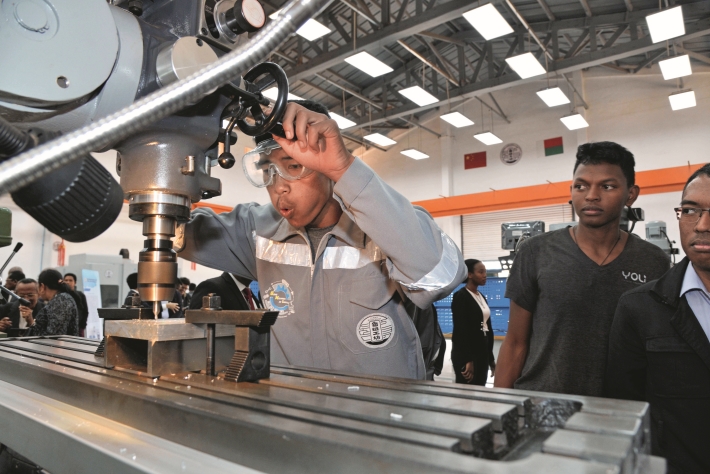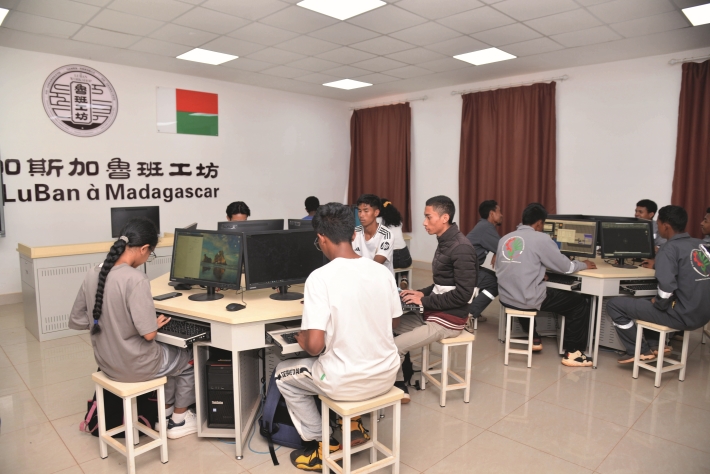|
||||||||||
| Home Top News Economy/Tech Culture/Sports China in Foreign Eyes Green Development Videos Intangible Cultural Heritages |
|
||||||||||
| Home Top News Economy/Tech Culture/Sports China in Foreign Eyes Green Development Videos Intangible Cultural Heritages |
| ChinAfrica |
| Bridging the Gap |
| Chinese Luban Workshop upskills Malagasy youth |
| By Derrick Silimina | VOL. 17 September 2025 ·2025-09-10 |

A student operates equipment at the Luban Workshop in Antananarivo, capital of Madagascar, on 26 April 2024 (XINHUA)
In the heart of Antananarivo, Madagascar’s sundrenched capital, Joseph Andrinirina flashes a nervous smile as he inspects a faulty car engine at the start of another day of work at his garage.
“Since I started this business six months ago, I enjoy being my own boss. I now earn a steady income, support my family, and provide jobs for others,” he told ChinAfrica.
Andrinirina’s confidence and optimism come from a recent qualification in mechanical engineering he gained through the Luban Workshop, a Chinese-backed vocational initiative aimed at transferring technical know-how and fostering economic empowerment.
Andrinirina, 30, completed a skills training programme at the Luban Workshop in Antananarivo and earned a diploma in automotive maintenance. After that he opened his own car repair workshop in Madagascar’s cultural and commercial hub of over 2 million people, specialising in engine repair.
“The Luban Workshop training has been a game changer for youth in Madagascar, because it offers vocational programmes that are essential for driving local industrialisation.”
Valuable training
The Luban Workshop in Madagascar was jointly established by Chinese institutions including the Tianjin Vocational College of Mechanics and Electricity, Tianjin Technician Institute of Mechanical and Electrical Technology and the University of Antananarivo in February 2022.
The first phase of cooperation established international majors in electrical and automotive engineering. It also developed a training centre for automotive repair and eight specialised laboratories equipped with cutting-edge systems, including hydraulic and pneumatic technology, modern electrical control, and automated production lines.
Over 100 students have received training at the Luban Workshop in areas such as industrial electricity, mechanical engineering, information technology, and automotive maintenance.
Supported by the broader China-Africa vocational education cooperation, the workshop has established a state-of-the-art automotive training centre and classrooms fitted with modern teaching tools. After three years of intensive study, most of the first cohort of 29 graduates have either secured jobs with major companies, started their own businesses or opted to continue their studies.
Natalie Rameliniaina, one of the graduates of Madagascar’s Luban Workshop with a degree in Information Technology, is working as an intern to further hone her skills before formally joining the workforce.
“After two months of hands-on experience, I feel confident and prepared to enter the workforce,” she shared, adding that her training at the Luban Workshop was practical and aligned with the needs of the industry.

Students attend a class at the Luban Workshop in Antananarivo, capital of Madagascar, on 10 February (XINHUA)
Fruits of cooperation
The Luban Workshops, part of eight major initiatives unveiled at the 2018 Beijing Summit of the Forum on China-Africa Cooperation, have filled the gap in vocational education cooperation between China and Africa. Since the launch of the first Luban Workshop in Djibouti in March 2019, a total of 14 such workshops have been established in African countries, including Kenya, South Africa, Mali, Nigeria, Egypt, Uganda, Côte d’Ivoire, Madagascar, and Ethiopia, according to the China International Cooperation Development Agency.
Built upon Chinese experience and technologies, the initiative aims to provide African youth with modern professional knowledge and skills, thus facilitating Africa’s economic and social development and accelerating its industrialisation. The Luban Workshop at the University of Antananarivo plays a critical role in addressing skill gaps in various sectors that are crucial for Madagascar’s economic development, experts say.
Through national initiatives such as “One District, One Factory,” Madagascar is pursuing widespread industrial growth. The Luban Workshop complements this goal by equipping local talent with the practical skills and technical exposure required to meet industry demands.
The workshop boasts advanced equipment and resources tailored for technical education. Specialised classrooms have been set up, ensuring that students gain hands-on experience with the tools and systems they will encounter in the workplace.
Faniry Rakotondrainibe, head of the Mechanical Engineering Programme at Luban Workshop, highlighted the capabilities of the workshop’s Computer Numerical Control (CNC) machines.
“Our students can now manufacture precision components efficiently. This type of teaching equipment is unique in Madagascar,” Rakotondrainibe said, adding that by leveraging Chinese expertise and resources, Madagascar is enhancing its educational infrastructure and capacity to produce skilled technicians and engineers.
CNC machines offer superior precision and speed, but most manufacturing companies in the country still rely on manual machine tools. “In the realm of precision manufacturing, CNC machine tools have revolutionised industries with their ability to create intricate and accurate components. Mastering this technology is essential for the country’s industrialisation.”
According to Edmond Randriamora, head of the Electrical Engineering Department of Madagascar’s Luban Workshop, graduates are highly sought after due to the programme’s emphasis on real-world skills that have made its students valuable assets in the job market.
“Even students in their second and third years are receiving job offers from top companies,” he stated.
The Luban Workshop initiative is part of a broader China-Africa cooperation framework aimed at improving vocational education across the African continent.
The establishment of the Luban Workshop is aligned with Madagascar’s national development strategy, which emphasises industrialisation and the enhancement of human capital. Equipping young professionals with the skills needed for industrial and technological advancement is crucial to achieve development.
Minister of Higher Education and Scientific Research Loulla Chaminah said that Madagascar’s close collaboration with China in vocational education is a game changer as it aligns with the nation’s broader development strategy.
In the meantime, Chinese Ambassador to Madagascar Ji Ping noted that China-Madagascar relations have moved forward steadily. Political mutual trust has deepened and pragmatic cooperation has brought substantial benefits to both peoples.
China hopes to broaden the path of win-win cooperation and common development, and jointly write a new and better chapter in bilateral relations, he said.
“Meeting people’s aspirations for a better life is our common goal. For over 50 years, our two countries have applied the spirit of cooperation marked by sincere friendship and equality, mutual benefit and common development,” Ji said.
| About Us | Contact Us | Advertise with Us | Subscribe |
| Copyright Beijing Review All rights reserved 京ICP备08005356号-5 京公网安备110102005860号 |